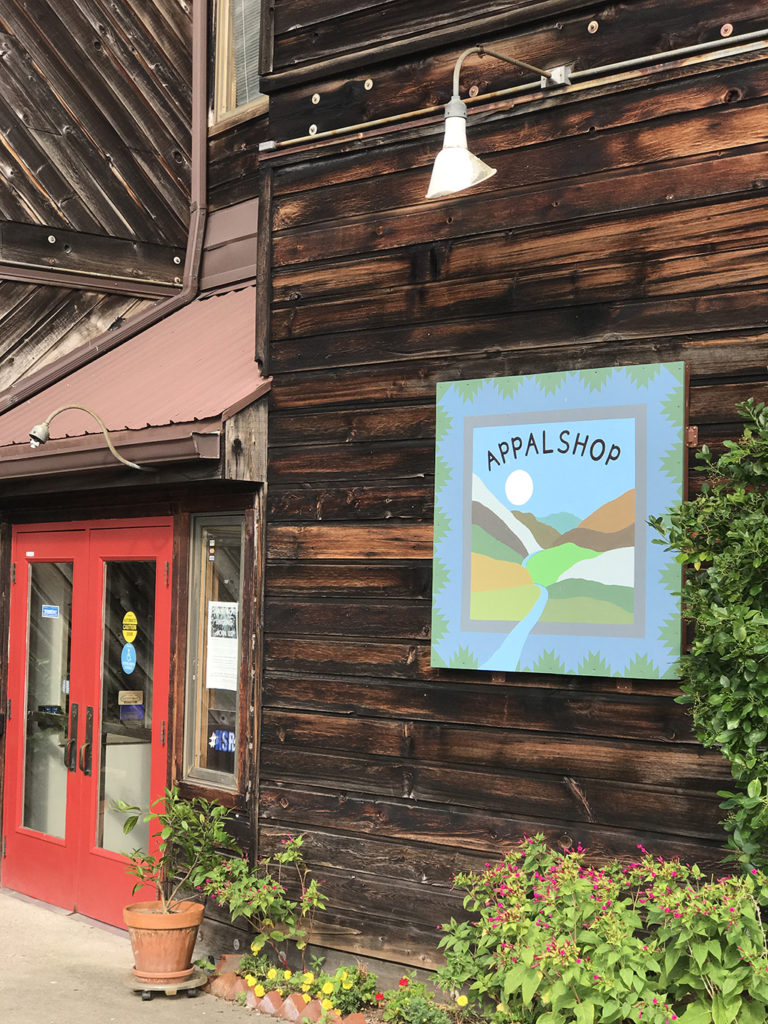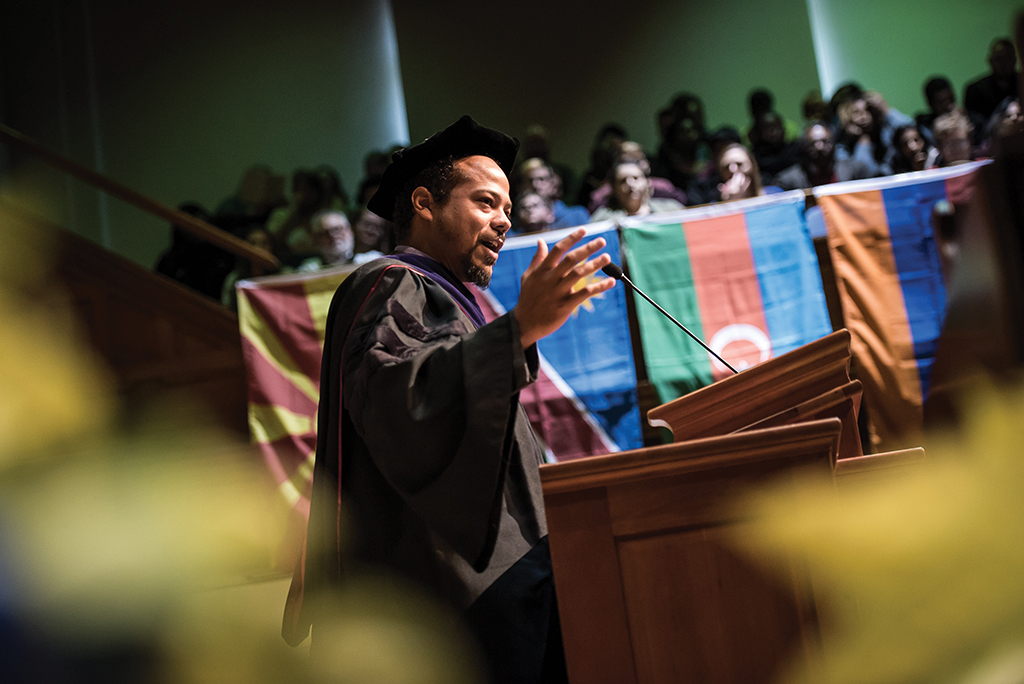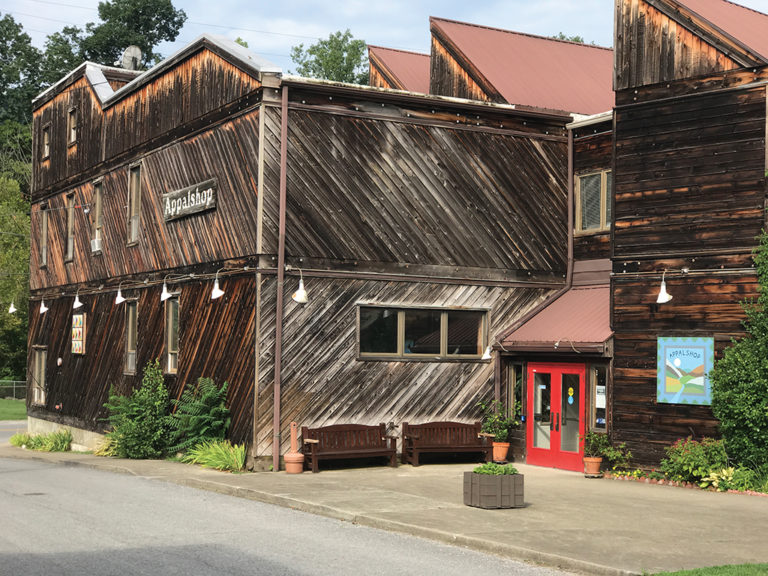Eastern Kentucky saw a new day when Appalshop unveiled the largest net-metered renewable energy system in the area in June 2019. The solar panels were installed to address the growing energy costs that affect the community and are expected to save Appalshop itself $8,400 per year. Collaboration and communication to meet the needs of the community are at the core of Appalshop’s mission, but the organization had not previously pursued a project so big and with so much potential for favorable community impact.
For more than 50 years, Appalshop has been dedicated to educating and empowering Appalachian communities by creating media that breaks stereotypes and tells the real stories of Appalachian people. What started as a small group creating films to counteract a pejorative narrative became an institution that includes theatre productions, radio, its own music labels, a literary journal and multiple workshops.

“We pursued the solar pavilion project to address a very specific community need,” said Alex Gibson ’08, Appalshop’s executive director. He explained that the two-year project was conceived through the realization that there was a monopoly on utilities services in the area.
“In order to reach a decision, we did what we have done for more than 50 years at Appalshop, which is engaging in community-based dialogues to try and address problems,” Gibson said. “And when enough conversations had been had, it was clear this was the [appropriate] solution.”
For Gibson and Appalshop, listening to the community’s needs is the key for progress. “When I was a Bonner Scholar at Berea, we went to Mexico, and we wanted to do something—we had to come up with an idea,” he said. “We wanted to do all these crazy things, and once we spoke to the community, they wanted a swimming pool.”
After helping build the pool for the community in Mexico and seeing the tourism success that ensued, Gibson realized that good work starts simply. “What would some overeducated Bonner Scholars know about this?” he remembers thinking. “It’s sharing with humility and listening. That is why at Appalshop we try not to be overbearing, controlling or blind—we can have an idea, but we are not attached to it—and letting that go for what the community wants is key to the impact of the work we do.”
Gibson heard about Appalshop through Berea because, as he describes, “everything of value in my life came from Berea.”
In order to reach a decision, we did what we have done for more than 50 years at Appalshop, which is engaging in community-based dialogues to try and address problems.
Alex Gibson ’08
“Understand that Berea is unique and special,” Gibson said about his college experience. “Everything is either connected to Berea, or pain, or pain that happened to me before Berea that shaped some angry feelings that Berea transformed into something more thoughtful.”
After growing up with the loss of his parents, brother and grandparents, he switched schools to a predominantly Black high school in Mississippi. Before then, he came from a predominantly white school in Eastern Kentucky. He struggled to fit in at either.
In Mississippi, he connected with the only Mexican student in his school and spent each summer through the rest of high school traveling with him to missions in Mexico that focused on indigenous people. From that moment, Gibson found himself attracted to learning more about marginalized communities in the world.
“I love finding these little places in the world where folks are not as glamorous, where you get to see the way a country puts its life together, the way a culture is manifested and built,” Gibson said.
Seeing how countries have different disputes and conflicts of their own and incorporating his time at Berea, Gibson was able to earn the Thomas J. Watson Fellowship to study identity making in countries such as India, Thailand and Venezuela.

“Like with Appalachians, I’m seeing this underdog, this consistent person who everybody is making fun of,” Gibson said. “The jokes are all the same, which happen from New Yorkers to Appalachians, that they are backwards, ignorant, have too many kids, and on and on.”
Gibson was attracted to Appalshop because of its commitment to narrative building. To him, identity is built on narrative, and Appalachia needs more art and stories from true Appalachian people.
“Storytellers are like any other most critical development,” he observed. “The stories we consume are as important as the food we eat. And they have perhaps a stronger impact, because the stories you consume determine the foods you consume.”
When asked what advice he would give to Appalachian students, Gibson highlighted the importance of having a free space for all kinds of dialogue.
For non-Appalachian students, he believes the best way to contribute to the community is to connect and speak with Appalachian people themselves. After all, he said, collective work is the definition of community work.
Appalshop will also continue its work focusing on racial issues. Gibson points out that there is an invisible sector of people whose needs are not being met, which he categorizes in levels of “invisible visibility.”
He explains that Black, Latinx and Asian Americans are some groups left sitting on the sidelines. An example he sees is the many Mexican restaurants in small towns where multiple Latin Americans work but are not engaging with the rest of the community. If they are not being reached out to, they will remain invisible.
It is here where Appalachia’s storytellers come in.
“We have to highlight those experiences in that part of the identity of Appalachia and think about what that storytelling would look like—and hiring more people of color is our immediate focus,” Gibson explained.
“The important thing for me is that the actions we take are meaningful and not just us hopping on a bandwagon,” he continued.
Gibson believes anybody can create their own Appalshop for their area.
“We will not have any change unless we get incredible organizing and really good stories that help us understand that a Southeast Asian, Latin American and an African all have the same interests at heart instead of bickering about the small little things that separate them.”


